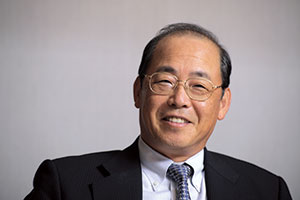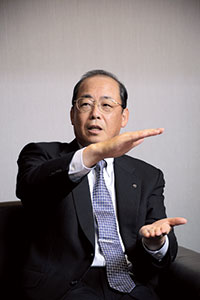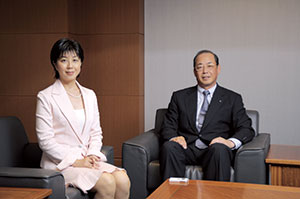Growth strategy focused on the future: (1) Contact center business as a value-changing business model
—This year marks the tenth anniversary of the founding of NTT WEST. Could you look back over these last ten years for us?
In one word, I would describe this period as “tough”. In the first few years, our objective was to pull ourselves out of the red, and since then, we have been working to improve our competitive edge and become a truly strong company with a firm competitive footing. At present, the information-communications market in NTT WEST’s business area (western half of Japan) is intensely competitive as we battle for users with power companies and CATV (cable television) operators acting as Internet service providers. NTT WEST’s share has dropped below 50% in 15 of the 30 prefectures making up this area. Nevertheless, revenues from IP (Internet protocol) services have been increasing steadily, and we expect them to make up about 30% of the company’s operating profit in fiscal year 2009. Thus, despite the difficult business environment, NTT WEST is advancing steadily toward its objectives.
As you know, these last ten years have seen many changes in the field of communications technology, such as the shift from fixed to mobile phones, the birth of mobile-phone-based Internet services and the appearance of novel technologies, and the migration from the metallic infrastructure to optical fiber. I guess one could think that it would have been better to concentrate one’s efforts on only network facilities during this time, but these developments were accompanied by severe competition in the industry, so the whole industry in Japan—and not just our company—was unable to escape this era of unbelievable change. Furthermore, as we see our domestic share leveling off, we are heading straight into an era that requires us to turn our attention to the world and to new fields. Looking at the next ten years against these dramatic changes, I feel strongly about the need to create a value-changing business model.

—“Value changing” sounds drastic. Has work on such a business model already begun?
NTT WEST is pursuing the expansion of original services that change the traditional view of business value as one way of promoting growth strategy businesses, which is one pillar of our medium-term management strategy. We have already begun to obtain the trust of our customers with these services.
A perfect example of this endeavor is our contact center business. With the aim of establishing a system that enables the entire NTT WEST Group to respond to the varied needs of our customers, we have established a section called the Contact Center Business Promotion Group to promote consultation and system construction in a company-wide manner.
Like a sales department, a contact center provides many opportunities for direct meetings with customers, so it plays a critical role as the face of the company. Forming close relationships with customers in this way can help raise customer satisfaction while making business operations more efficient by unifying information on received orders and other transactions.
In conjunction with the establishment of the Contact Center Business Promotion Group, we are also developing contact center solutions under a program entitled “Making a Single Encounter into Many” to help our customers improve responsiveness to their customers and achieve more concrete results. These include proposal activities by business type to meet specific customer needs, contact center inter-business seminars to facilitate exchanges among our customers who are operating contact centers, and use of customer feedback to reflect information collected by a contact center in corporate business strategy. In other words, we are also promoting the formulation of problem-solving proposals.
—This contact center business appears to be a service that can also provide customers with business opportunities.
Many consultations with customers who are operating contact centers deal with personnel training, business operation, and corporate strategy irrespective of the type of business. We often hear requests like “How do other companies deal with this problem?” and “Could you give us a case study from other companies?” We responded to these requests, that is, to real situations, by holding contact center inter-business seminars and consulting on the use of customer feedback. Although recent news has reported an improvement in business conditions, the effects of the worldwide recession still linger. In an increasingly severe corporate business environment, I believe that contact centers that can make business operations more efficient will take on an increasingly important role.
Growth strategy focused on the future: (2) Active development of revenue-increasing businesses
—Seeing this approach focused not only on communications technology but also on listening to the world around you tells me that flexible thinking and diverse business development is the key to success.
That’s right! Even the slightest of opportunities or change in viewpoint or frame of mind can lead to new business. Let me give you a few examples.
To begin with, there is the NTT-WEST-HOMETECHNO group of companies that began operation in July 2008 in response to the shift toward in-home use of information appliances. These companies provide convenient services for home users such as the wiring and repair of home network devices as well as the repair of even non-NTT home appliances and the configuring of personal computers based on an outsourced staff of over 10,000 technicians. After the deregulation of telephone terminals, we essentially gave up on the home as a growing market, but through maintenance and consultation provided by these HOMETECHNO companies, I believe that the home can once again be an important contact point. Making direct contact with the needs of individual households should lead to great business possibilities!
Next, as a distinctive strategy of the NTT WEST Group, we have been involved in the delivery of cell-phone comics (keitai manga) as a mobile-content business since 2004. As of April 2009, we have recorded about 500 million downloads. And in October 2009, we began providing Japanese comic content to India’s rapidly growing mobile market.
NTT WEST is also involved in the digital cinema business, providing a commercial digital cinema delivery service called PURE CINEMA—the first in Japan. This service uses the Next Generation Network (NGN) to connect an NTT SMARTCONNECT data center with a movie theater equipped with digital screening facilities so that an encoded, high-quality movie file and decryption key can be delivered by secure means based on the requests of a movie distribution company. In July 2009, the movie “Knowing” distributed by Toho-Towa Company was delivered to 14 sites throughout Japan as the first work to be delivered by PURE CINEMA.
We have also conducted a trial on relaying a live broadcast of the Takarazuka Revue (a stage performance) to a movie theater as an example of using this digital cinema delivery network in a new way. The audience was quite impressed saying, “This is a completely new kind of service!” On the basis of this positive response, we have continued to provide relays of the Takarazuka Revue as well as live stage greetings from movie celebrities and live concerts to movie theaters throughout Japan via the NGN.
The key to developing new business is to find a way to deal with such real feedback, responses, and problems and to appeal to the customer’s sense of value. I feel that there is much that NTT WEST can do in this regard. But first, it is important to determine where one stands in the present.

Creation or maintenance? The battle is won by people.
—Determining one’s present situation seems difficult in practice. There must be many things to consider as a company employee as opposed to an individual, as well as the extent of one’s social contributions.
As it happens, a pre-hire orientation ceremony was held today (October 1, 2009) here at NTT WEST. This ceremony provides something positive to people who will be entering the company next year as new employees. But what I would like to point out is that those who choose the telecommunications industry and NTT WEST in particular because they believe it to be a stable environment will find it hard to survive in the years to come. In reality, a new employee will be putting himself or herself into a highly competitive business environment unlike anything seen before. The telecommunications industry, which, as I have mentioned, has undergone dramatic changes over the last ten years, is now entering an era in which it will have to confront previously unimagined enemies. It is exactly because these new enemies are difficult to comprehend that relationships characterized by mutual acceptance of diverse values will be needed to prepare us for battle with them.
This approach will also be expected of people engaged in research and development (R&D) fields both inside and outside the NTT Group. As the market structure goes through big changes, I would like to see researchers take on multifaceted R&D projects instead of focusing on just one theme. At present, there are many amazing R&D projects in the works, and some are showing great promise. However, at the stage at which new technology gets converted into services, doubts may be encountered such as whether user needs will really be met by such new technology. How will greater efficiency and higher quality translate into something useful for society? Should a product be reshaped into something that meets the expectations of customers? To deal with questions like these, I would like to see the producers at research laboratories and business office staff demonstrate their ability to mediate and bridge between the R&D and business sides of the company. In the R&D world, one often hears talk about the 3/1000 principle (3 out of 1000 ideas are great), which essentially means that there are only a few times in R&D when things are going really well. In research, many challenges must be taken up in order to succeed even just three times. That is why I ask both research and business development to take a bold approach and undertake many diverse projects. Although only 3 successes out of 1000 attempts may sound depressing from a business perspective, giving birth to even three new products in a somewhat efficient manner may very well give new life to the company (smiles).

About 25 years ago, I learned two interesting words from one of my seniors at work. They came from a Chinese classic titled Joganseiyo, which is said to be one of the original studies on ruling an empire. The two words were soso and shubun: the former refers to the creation of a new enterprise and the latter to the maintenance of that which has already been created. In facing today’s difficult business environment, I do not believe that NTT WEST needs to make a hard and fast choice between soso or shubun. Instead, I feel that it is more important to take a good look at the present situation before deciding the path to take. In short, the key to success is to know your surroundings, that is, to answer the question: “Where do I stand?”
However, armchair strategy is different from reality. Many battles have been lost despite the best-laid plans of top generals. Not everything goes according to plan. What keeps moving is people!
↑ TOP

